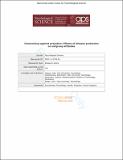Immunizing against Prejudice: Effects of Disease Protection on Attitudes toward out-Groups
Author(s)
Ackerman, Joshua; Huang, Julie Y.; Sedlovskaya, Alexandra; Bargh, John A.
DownloadJYH_AS_JMA_JAB_Disease_Protection_on_Prejudice_rev__SUBMITTED.pdf (238.4Kb)
OPEN_ACCESS_POLICY
Open Access Policy
Creative Commons Attribution-Noncommercial-Share Alike
Terms of use
Metadata
Show full item recordAbstract
Contemporary interpersonal biases are partially derived from psychological mechanisms that evolved to protect people against the threat of contagious disease. This behavioral immune system effectively promotes disease avoidance but also results in an overgeneralized prejudice toward people who are not legitimate carriers of disease. In three studies, we tested whether experiences with two modern forms of disease protection (vaccination and hand washing) attenuate the relationship between concerns about disease and prejudice against out-groups. Study 1 demonstrated that when threatened with disease, vaccinated participants exhibited less prejudice toward immigrants than unvaccinated participants did. In Study 2, we found that framing vaccination messages in terms of immunity eliminated the relationship between chronic germ aversion and prejudice. In Study 3, we directly manipulated participants’ protection from disease by having some participants wash their hands and found that this intervention significantly influenced participants’ perceptions of out-group members. Our research suggests that public-health interventions can benefit society in areas beyond immediate health-related domains by informing novel, modern remedies for prejudice.
Date issued
2011-06Department
Sloan School of ManagementJournal
Psychological Science
Publisher
Sage Publications/Association for Psychological Science
Citation
Huang, J. Y. et al. “Immunizing Against Prejudice: Effects of Disease Protection on Attitudes Toward Out-Groups.” Psychological Science 22.12 (2011): 1550–1556.
Version: Author's final manuscript
ISSN
0956-7976
1467-9280